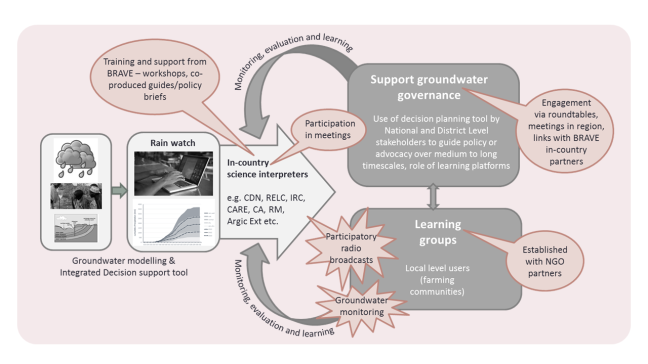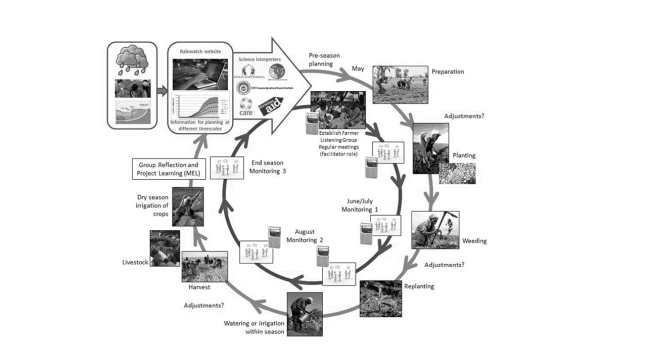 The BRAVE project will provide an essential ingredient for evidence-based mitigation and adaptation policies in Sub-Saharan Africa. Through working directly with stakeholders through face-to-face meetings and the planned workshops in each country, we aim to develop water demand scenarios to inform the modelling, based on current domestic, agricultural and productive use needs, set within the context of the contemporaneous impacts on, for example, groundwater-based irrigation schemes in the River Volta Basin.
The BRAVE project will provide an essential ingredient for evidence-based mitigation and adaptation policies in Sub-Saharan Africa. Through working directly with stakeholders through face-to-face meetings and the planned workshops in each country, we aim to develop water demand scenarios to inform the modelling, based on current domestic, agricultural and productive use needs, set within the context of the contemporaneous impacts on, for example, groundwater-based irrigation schemes in the River Volta Basin.
Catalyst Phase →
THE BIG IDEA
We can build better ways to model and communicate the complex environmental changes in the Sahel region of West Africa and use that to improve the long term planning of groundwater supplies and provide early warnings of groundwater shortages so that the most vulnerable families and communities are more resilient to drought.
RESEARCH AIM / HYPOTHESIS
That by using integrated governance, the long term use of groundwater can reduce the vulnerability of poor people in the Volta River Basin, in West Africa, in the face of a variable climate and changes to the local environment, society and economy.
STUDY DESCRIPTION
Secure access to water by the rural poor in Africa is central to the achievement of the Sustainable Development Goals. With more than 500 million Africans dependent on groundwater and the potential for expanded use, the resilience of aquifers in the face of climate, population growth, and land-use change is key to this. Evidence suggests however, that during extended periods of low rainfall, groundwater supplies from low storage aquifers can fail. It is unclear, therefore, whether planned development of substantial numbers of groundwater supplies as a means to meet the expected large increase in demand, will be effective in all areas of sub-Saharan Africa. In the absence of long historical records of borehole levels, we are reliant on process understanding and modelling to infer the stability of groundwater supplies.
In partnership with national and local government, NGOs and researchers, the BRAVE project will incorporate new understandings of climate variability and observational capacity and its water resource impacts into the planning and operation of groundwater supplies in the Volta River Basin. As a result of improved understanding of how water moves through catchments representative of the Volta River Basin, new scientific knowledge will allow appropriate tools to be developed for planning at a range of scales: basin-scale long-term regional planning of aquifer-based water supplies for domestic and productive uses; local-scale long-term and seasonal community management of groundwater supplies; and provision of information that allows timely emergency planning in the light of developing drought conditions. Information provided to communities includes Rainwatch information primarily through radio broadcast which are community driven workshops referred to as community listening groups.
Project design and national policy institutional framework
Because the BRAVE project is interdisciplinary and multi-layered, the project design is imperative to understanding how it aims to inform national and regional policy frameworks.
This multi layered project design allows stakeholders to understand complex processes that lead to groundwater recharge, the equally complex social structures that determine groundwater access and use, and the policy planning and governance that is required to bring about sustainable change to groundwater resources.
By ensuring that there are continuous feedback loops in place, and that all the stakeholders are involved in each key step, BRAVE provides a framework for new, in-country communication structures that allow information to be explained through appropriate formats, at appropriate times to a range of different users. This allows the information to be embedded into existing institutional structures that support seasonal, medium and longer term groundwater and agricultural planning in Ghana and Burkina Faso.
RESEARCH ORGANISATIONS
- University of Reading (UR), UK – Grant NE/M008983/1
- British Geological Survey (BGS), UK – Grant NE/M008827/1
- Lorna Young Foundation (LYF), UK & West Africa
- Water Research Institute (CSIR), Ghana
- University of Ouagadougou (UO), Burkina Faso
RESEARCH TEAM
- UR: Dr Rosalind Cornforth (PI), Ass. Prof. Henny Osbahr, Dr Emily Black, Prof. Anne Verhoef, Dr Galine Yanon, Jacob Myers
- BGS: David Macdonald (co-PI), Matt Ascott , James Sorensen, Dr Chris Jackson
- LYF: Cristina Talens
- CSIR: Dr William Agyekum
- UO: Dr Jean Pierre Sandwidi
WORKING IN:
- Burkina Faso
- Ghana
Visit the BRAVE website
Related outputs
- Ascott et al. (2020) In Situ Observations and Lumped Parameter Model Reconstructions Reveal Intra‐Annual to Multidecadal Variability in Groundwater Levels in Sub‐Saharan Africa, Water Resources Research, Volume 56, Issue 12 December 2020
- Cornforth, Rosalind J, Macdonald, David M. J., Osbahr, Henny, Ciampi, Luisa, Myers, Jacob, Verhoef, Anne, … Haruna, S. (2019, November 8). Possible futures for groundwater in Burkina Faso under a changing climate (Version 1.0). Zenodo. http://doi.org/10.5281/zenodo.3533108
- Cornforth, Rosalind Jane, & Myers, Jacob. (2020, April 9). ‘BRAVE’ Groundwater Futures for Burkina Faso: Critical Planning for the Water Sector (Version 1.0). Zenodo. http://doi.org/10.5281/zenodo.3746621
- BRAVE Social Science Activity Report – Burkina Faso February-2019 (Narcisse Gahl)
- “Detection and attribution of human influence on regional precipitation” Nature Climate Change 6, 669–675 (2016) doi:10.1038/nclimate2976
- Black E, Tarnavsky E, Maidment R, Greatrex H, Mookerjee A, Quaife T, … Brown M. (2016). The Use of Remotely Sensed Rainfall for Managing Drought Risk: A Case Study of Weather Index Insurance in Zambia. Remote Sensing, (4), doi: 10.3390/rs8040342
- Brown M, Black E, Asfaw D, Otu-Larbi F. (2017). Monitoring drought in Ghana using TAMSAT-ALERT: a new decision support system. Weather, (7), doi: 10.1002/wea.3033
- Dunning C, Allan R, Black E. (2017). Identification of deficiencies in seasonal rainfall simulated by CMIP5 climate models. Environmental Research Letters, (11), doi: 10.1088/1748-9326/aa869e
- Jones L, Harvey B, Cochrane L, Cantin B, Conway D, Cornforth R, … Kirbyshire A. (2017). Designing the next generation of climate adaptation research for development. Regional Environmental Change, (1), doi: 10.1007/s10113-017-1254-x
- Maidment RI, Grimes D, Black E, Tarnavsky E, Young M, Greatrex H, … Alcántara EMU. (2017). A new, long-term daily satellite-based rainfall dataset for operational monitoring in Africa. Scientific data, 4, pp. 170063. doi: 10.1038/sdata.2017.63
- Parker H, Cornforth R, Suarez P, Allen M, Boyd E, James R, … Walton P. (2016). Using a Game to Engage Stakeholders in Extreme Event Attribution Science. International Journal of Disaster Risk Science, (4), doi: 10.1007/s13753-016-0105-6



Comments
4 responses to “BRAVE: Building understanding of climate variability into planning of groundwater supplies from low storage aquifers in Africa”
[…] Walker Institute, University of Reading is leading a consortium which is working with practitioners and government in Ghana and Burkina Faso to understand where to […]
[…] BRAVE: Building understanding of climate variability into planning of groundwater supplies from low … […]
[…] BRAVE: Building understanding of climate variability into planning of groundwater supplies from low … […]
[…] BRAVE: Building understanding of climate variability into planning of groundwater supplies from low … […]